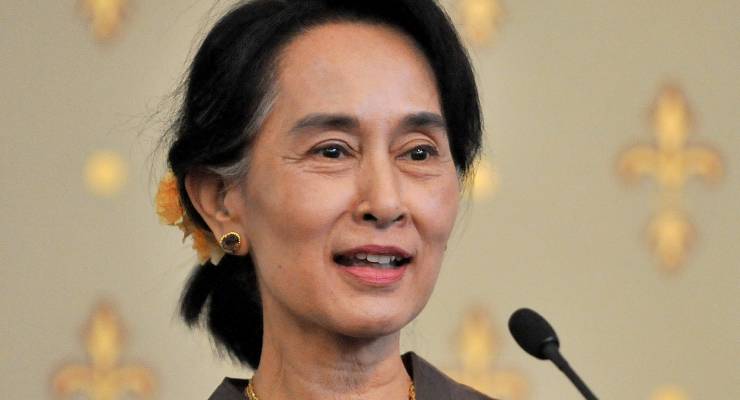
Hosting Nobel Peace laureate Aung San Suu Kyi would once have been a significant honour; now a visit from her is marked with a badge of shame.
The ethnic cleansing of Rohingya people since August 25, 2017, has been met with silence, and some say complicity, from Myanmar’s once-celebrated leader.
The US Holocaust Museum even revoked its Elie Wiesel Award, stating that Suu Kyi had failed to live up to the vision of a world “where people confront hatred, prevent genocide and promote human dignity”.
With the Rohingya refugee count in Bangladesh now close to 700,000, and the recent revelation that up to 43,000 are missing, presumed killed, the scale of the crisis only continues to mount.
For the Australian government, the upcoming ASEAN conference this weekend provides an opportunity to raise vital questions concerning the Rohingya crisis, and to confront a leader who has consistently refused to engage with the international community on the issue.
Yet is such a confrontation likely to occur?
The Australian government’s response to the Rohingya crisis so far has been weak.
The Australian government has provided up to $30 million in aid assistance by way of Save the Children, Oxfam and other NGOs.
Yet even as recently as October 2017 — two months after the attacks on Rohingya villages became apparent — the Australian government was still touting a plan to pay Rohingya refugees on Manus Island to return to Myanmar.
Australia’s relationship with the Myanmar Army — the Tatmadaw — has also come under scrutiny.
The blatant role of the Tatmadaw in this most recent spate of ethnic cleansing has seen the US, UK, Canada, France and the EU cut ties with Myanmar’s military.
However, the Turnbull government has refused to do so.
Instead, the Australian government will spend up to $400,000 on training for the Tatmadaw in 2017-2018, including English lessons and participation in military exercises.
According to a Defence spokesperson, the continuation of training is in order to “promote professionalism and adherence to international laws” within Myanmar’s armed forces.
Yet if this is the aim, then the partnership is clearly failing, and needs to be reviewed immediately.
Similarly, the Department of Foreign Affairs and Trade (DFAT) has provided $66.4 million in development aid to Myanmar in 2017/2018.
One of the stated objectives is to secure “peace and stability” in Rakhine state, where the ethnic cleansing of Rohingya has occurred.
Ostensibly, the aims of DFAT’s investment is to support Myanmar “to become a party to international human rights treaties and implement international human rights norms”.
Such an investment in the region has clearly failed, and strong questions should be raised of Suu Kyi as to why.
That Australian companies such as Woodside Petroleum are exploring for natural gas in Rakhine state also gives the government additional leverage to pressure the Myanmar government to act on the issue of Rohingya.
This should include not only the right of Rohingyan people to repatriation, but the right to full citizenship, and a commitment that such attacks will never happen again.
The current talks of repatriation between Bangladesh and Myanmar, however, remain vague and are clearly diluted by the recent revelations that the Myanmar Army is now building military bases on land that used to house Rohingya villages and mosques.
Whether the ethnic cleansing and forced exodus of 700,000 Rohingya people into Bangladesh is part of a concerted effort to procure vacant land for military and corporate enterprise is another tough question that should be asked of Suu Kyi.
Currently, the Myanmar government and military are predominantly made up of dominant Bamar Buddhists. It has been in part due to this mono-culture in every avenue of power that has led to the hardened xenophobia against the Rohingya, and other ethnic and religious minorities in Myanmar.
Opening up the realms of power to be more inclusive will be one step to ensuring DFAT’s aims of securing “peace and stability” in Rakhine and empowering Myanmar to “to become a party to international human rights treaties and implement international human rights norms”.
Yet whether Malcolm Turnbull will take the opportunity to tackle the tough issues with an equally tough woman — known in Myanmar simply as “the Lady” — is highly unlikely.
In fact, an Australian government outline of the ASEAN talks reiterate that while the Rohingya crisis “could arise in bilateral discussions, they are not likely to be considered formally in the multilateral Special Summit in Sydney”.
And with Malcolm Turnbull’s recently announced plan to turn Australia into a regional defence exporter, one wonders what the nature of the talks will actually be.








The country’s name is Burma. The ugly noise “Myanmar” was foisted on the country by a bunch of murderous thug generals whose ultimate fate hopefully will be quick trial and execution. Journos fortunate enough not to live in Burma do the Burmese, journalism and language a disservice by referring to Burma as “Myanmar”.
What a bloody silly question,of course the grovelling snivelling coward wont confront her!
‘Will Turnbull Confront…?’
Easy question: no. Not a single example of Turnbull confronting anyone springs to mind however egregious the situation.
The concept of any of our 21st century Oz prime ministers climbing onto their high horse to criticise another nation’s human rights is risible.
Kyi is first & foremost a Burman, her father’s daughter and he was the first head of the junta which overthrew the nascent, post Raj democracy.
One of Hawke’s first postPM jobs was as a schill for the generals whilst Kyi was under long term house arrest.
BTW, no mention of Wahhabi agency in this sorry tale?
‘The Rohingya were never loved but, until recently, mostly ignored.
The Myanmar defence forces control the country…NOT Suu Kyi. ‘Democracy’ there is just a sham. So what would you have the Lady do exactly?
Also…this conflict between the Bengalis (NOT Rohingya, a term only in use since the 1990s) and the native people of Myanmar, has been going on for centuries…but in its current form since WW2. It is all about religion…who would have guessed!!
On reading the history of this region, it becomes clear that during WW2, the Bengal Indians (Moslems) perpetrated their own massacre on the Burmese locals (Buddhists), with guns and weapons given to them by the British…they also destroyed much of their infrastructure in what is now Rakhine State. The Bengalis have not been recognised as citizens of Myanmar ever…so why is there now a call for Myanmar to grant them citizenship? They are not, and have never been, one of the recognised ‘races’ in the Myanmar constitution.
The whole situation is diabolical…but blaming Suu Kyi is plainly ridiculous, when this has been going on forever!
So we can’t say Rohingya because the term’s only been in use since the 1990s…how long has Burma been called Myanmar?
And what sort of country has a constitution that only recognises some “races”?
Well, Malaysia actually. In that its Constitution only recognises Malays as first class citizens entitled to full rights and privileges. Not only are Chinese and Indian citizens not first class, but even the original indigenes, who predated the arrival of the Malays.
But, are they subjected to genocide therefore?
And what sort of country has a constitution that only recognises some “races”?
Exactly, and furthermore in what kind of country is murder of its residents ok?
Jesus, CML 😐 Labourists really are worthless.
What…you can’t handle the historical truth????
I would appreciate it if you would confine your remarks to the subject under discussion. Personal abuse should not be permitted here.
Suu Kyi could dissociate herself from the false ‘democracy’ and speak against injustice. The border between Burma/Myanmar and Bengal is a product of the colonial masters and the people who found themselves on either side of that border should have citizenship of the state in which they find themselves. A claim that the Rohingya have never been recognised as citizens in the land of their birth and therefore never should become citizens is nothing but an endorsement of racism and state injustice. If the writer making that claim comes from Burma/Myanmar s/he would have arrived in Australia having never possessed Australian citizenship. Is that a reason for never receiving citizenship?
Last time I looked, Myanmar was a sovereign country entitled to make its own laws and follow its own constitution.
We in Oz don’t have to like it…just as many people in other countries don’t like some of our laws regarding asylum seekers and off-shore detention, but surely you are not suggesting there should be some world wide system of enforcing countries to follow certain rules/laws? If so…WHOSE RULES/LAWS…who decides?
Also..Suu Kyi did ‘dissociate herself from the false democracy and speak against injustice’ for many years. For her trouble she was barred from politics/government…even though she won an election…and placed under house arrest for most of the 1990s and beyond. So I repeat…what is it exactly that everyone wants this Lady to do?
Nothing is ever easy where power and religious differences are involved!